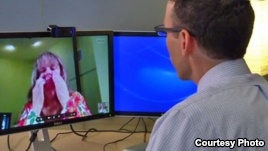From VOA Learning English, this is the Health Report.
Telemedicine is the name for when doctors give advice to patients by telephone or the Internet, or when health care providers in rural areas connect with specialists in big cities.
Telemedicine has existed for a long time, but the rise of smartphone, tablets and webcam-equiped computers is raising telemedicine to new levels. Some health care systems in the United States now offer Virtual Urgent Care, patients see a doctor by video chat without having to leave home.

Diana Rae of Tenino, Washington, demonstrates virtual urgent care with Dr. Ben Green in Seattle, who consults with her via Skype. (Courtesy of Franciscan Health System)
Diana Rae is a nurse educator in the western state of Washington. She recently demonstrated how Virtual Urgent Care works. She used a iPad tablet and skype -- the video chat service.
"Hi, yes, my name is doctor Ben Green, among the doctors with Franciscan Virtual Urgent Care."
Doctor Green has the patient describe her symptoms, then the doctor performs a physical exam by demonstrating what he wants her to do.
Doctor Green decides that the problem is a silence infection. For medicine, he prescribes an antibiotic. He says about 3 out 4 patients have health problems that can be treated like this -- through Virtual Urgent Care, that means a video chat could replace a visit to the doctor's office.
"Patient safety is really important to us. So if we feel like the patient is not safe to be treated in this manner, we're going to suggest other alternatives for them," said Green.
The Franciscan Health System is based in Tacoma, Washington. Franciscan charges $35 for this kind of virtual house call, that is much less than the cost of going to an emergency room, a doctor's office or an urgent care clinic.
After trying the video conference, Diana Rae says she would been happy to pay the 35$, when she was recently home with a bad cold.
"I would've paid twice that for the convenience of getting taken care of without having to sit in a waiting room, wait, and get exposed to everyone else's germs," Rae said.
Franciscan operates hospitals, clinics and a hospice for end-of-life care. Franciscan has a deal with a company called Carena to add virtual urgent care by Skype or phone. Carena is one of several companies doing this kind of work around the country. But a company official says state rules have not kept progress with developments in telemedicine.
The workers who provide virtual urgent care must be separately licensed in each state where the company does business. For now, that means Carena doctors can treat patients in Washington state and California for example, but not in neighboring Oregon or Idaho.
And that's the Health Report from VOA Learning English. I'm Christopher Cruise.
译文属可可原创,仅供学习交流使用,未经许可请勿转载












